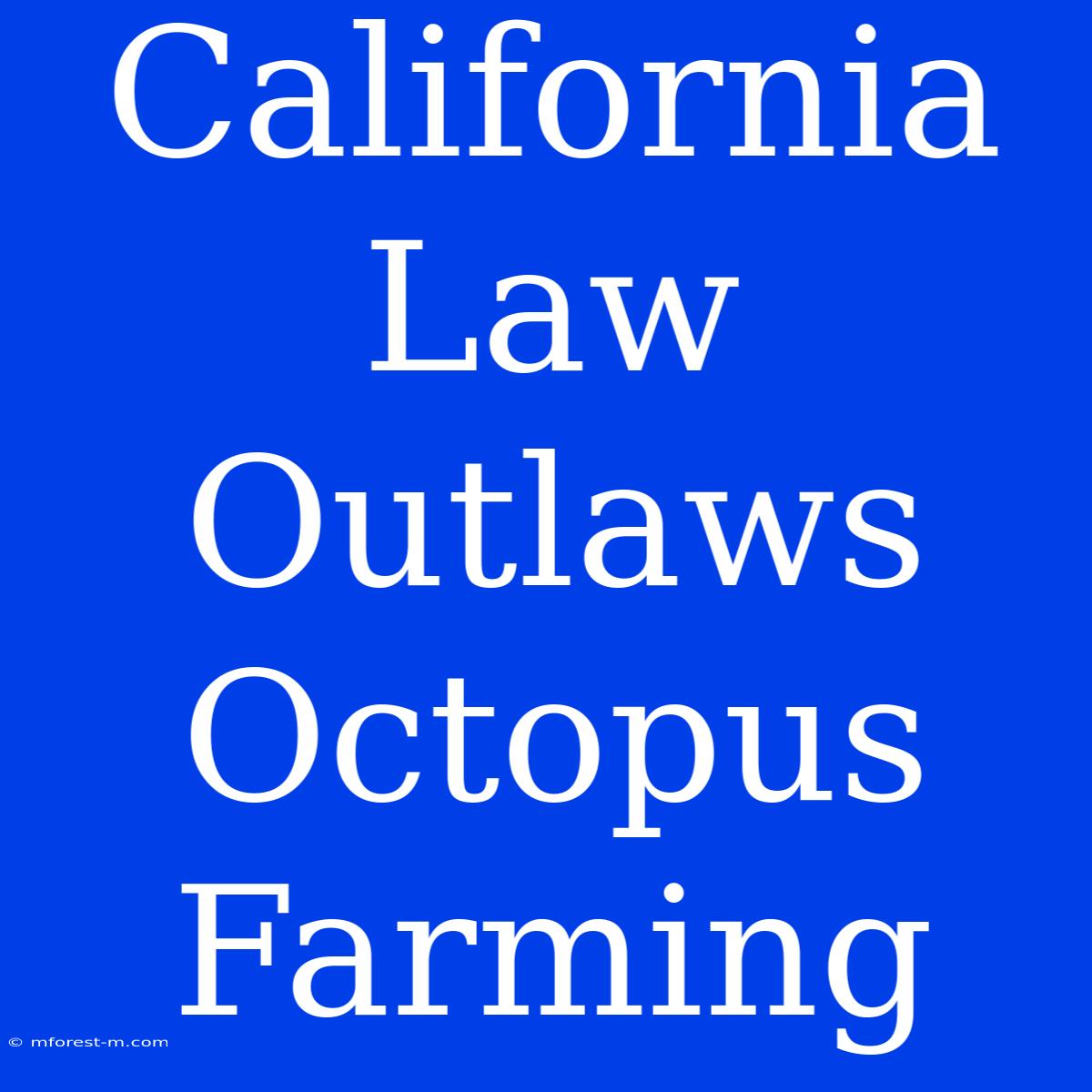California Law Outlaws Octopus Farming: A Bold Move for Animal Welfare
Is octopus farming ethical? California has declared it illegal, sending a strong message about the importance of protecting these intelligent creatures. Editor Note: California has officially outlawed octopus farming, marking a significant step towards protecting these intelligent cephalopods. This groundbreaking legislation raises important questions about animal welfare and the future of sustainable seafood.
This decision underscores the growing awareness about the complex cognitive abilities and sentience of octopuses. While the demand for octopus meat is rising globally, the ethical implications of farming these sentient beings have come under increasing scrutiny.
Our analysis delves into the key factors behind this landmark law, exploring the scientific evidence for octopus sentience, the potential welfare challenges of octopus farming, and the implications for both the seafood industry and animal welfare.
Key Takeaways:
| Feature | Description |
|---|---|
| Octopus Sentience | Scientific evidence points to octopuses possessing advanced cognitive abilities, including problem-solving, tool use, and complex social interactions. |
| Ethical Concerns | Confining octopuses in cramped tanks for commercial purposes raises ethical questions about animal welfare. |
| Sustainability | The environmental impact of octopus farming is a significant concern, with potential for habitat destruction and water pollution. |
Octopus Sentience and Ethical Considerations
The ability to feel pain, stress, and emotions is a crucial factor in determining the ethical treatment of any animal. Octopus sentience has been increasingly recognized by scientists through various studies.
Facets of Octopus Sentience:
- Problem-solving and Tool Use: Octopuses exhibit remarkable problem-solving abilities, including the use of tools to escape enclosures and open containers.
- Complex Social Interactions: They engage in complex social interactions, displaying individual personalities and unique communication methods.
- Pain Perception: Studies demonstrate that octopuses experience pain in a similar way to vertebrates, exhibiting physiological responses and behavioral changes.
These findings highlight the ethical complexities of confining and exploiting these intelligent creatures for commercial purposes.
Ethical concerns arise when considering the limitations of octopus farming practices:
- Confined Spaces: Farming octopuses typically involves keeping them in small tanks, restricting their natural movement and exploration.
- Stress and Disease: The unnatural environment and close proximity can lead to heightened stress and susceptibility to disease.
- Unethical Practices: Certain farming practices, such as the use of electric shocks for handling, raise serious ethical concerns.
The Impact of the California Law
This landmark decision signifies a growing global trend towards recognizing the importance of animal welfare in the seafood industry.
Impacts and Implications:
- Shift in Consumer Attitudes: The law is likely to influence consumer preferences, creating a demand for more ethically sourced seafood.
- Innovation in Aquaculture: This ban could encourage research and development of sustainable and humane aquaculture practices for other species.
- Global Implications: California's legislation may serve as a model for other jurisdictions considering similar regulations.
FAQs
What are the benefits of outlawing octopus farming? The primary benefit is the protection of octopus welfare. This legislation recognizes the intelligence and sentience of these animals, prioritizing their wellbeing over commercial interests.
How will this impact the seafood industry? The ban will likely increase demand for alternative seafood sources, potentially driving innovation in sustainable aquaculture practices.
What are the ethical considerations of octopus farming? Octopus farming raises serious ethical concerns about animal welfare. The confined spaces, stress, and potential for inhumane treatment raise questions about the morality of this practice.
What are the alternatives to octopus farming? Developing sustainable and ethical fisheries management practices, as well as exploring alternative protein sources, are essential to ensuring a future where seafood production doesn't compromise animal welfare.
Tips for Sustainable Seafood Consumption
- Choose sustainably sourced seafood: Support fisheries that employ responsible practices and minimize bycatch.
- Reduce consumption of octopus and other cephalopods: Consider alternative seafood options that minimize the impact on vulnerable species.
- Advocate for ethical seafood practices: Support organizations working to promote animal welfare and sustainable fishing methods.
Conclusion:
California's ban on octopus farming marks a significant step towards recognizing the intelligence and sentience of these fascinating creatures. By prioritizing animal welfare, this law sets a precedent for a more ethical and sustainable future for the seafood industry. The future of octopus consumption and farming practices remains uncertain, yet this decision highlights the critical need for greater awareness and responsible choices in our interactions with the natural world.

